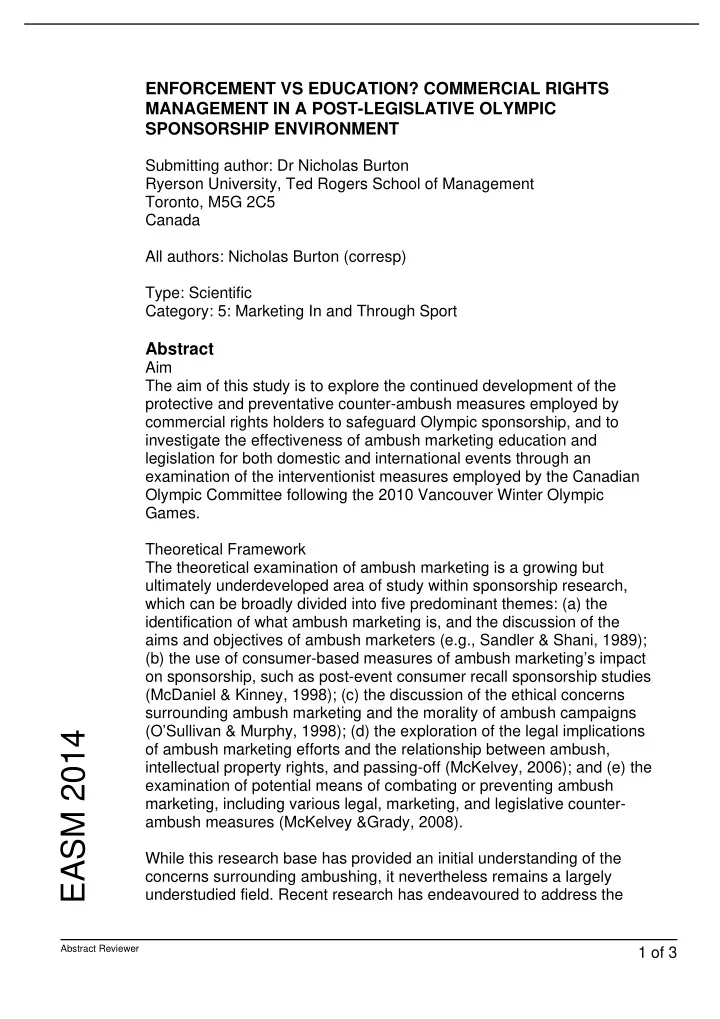

ENFORCEMENT VS EDUCATION? COMMERCIAL RIGHTS MANAGEMENT IN A POST-LEGISLATIVE OLYMPIC SPONSORSHIP ENVIRONMENT Submitting author: Dr Nicholas Burton Ryerson University, Ted Rogers School of Management Toronto, M5G 2C5 Canada All authors: Nicholas Burton (corresp) Type: Scientific Category: 5: Marketing In and Through Sport Abstract Aim� The aim of this study is to explore the continued development of the protective and preventative counter-ambush measures employed by commercial rights holders to safeguard Olympic sponsorship, and to investigate the effectiveness of ambush marketing education and legislation for both domestic and international events through an examination of the interventionist measures employed by the Canadian Olympic Committee following the 2010 Vancouver Winter Olympic Games.� � Theoretical Framework� The theoretical examination of ambush marketing is a growing but ultimately underdeveloped area of study within sponsorship research, which can be broadly divided into five predominant themes: (a) the identification of what ambush marketing is, and the discussion of the aims and objectives of ambush marketers (e.g., Sandler & Shani, 1989); (b) the use of consumer-based measures of ambush marketing’s impact on sponsorship, such as post-event consumer recall sponsorship studies (McDaniel & Kinney, 1998); (c) the discussion of the ethical concerns surrounding ambush marketing and the morality of ambush campaigns (O’Sullivan & Murphy, 1998); (d) the exploration of the legal implications EASM 2014 of ambush marketing efforts and the relationship between ambush, intellectual property rights, and passing-off (McKelvey, 2006); and (e) the examination of potential means of combating or preventing ambush marketing, including various legal, marketing, and legislative counter- ambush measures (McKelvey &Grady, 2008).� � While this research base has provided an initial understanding of the concerns surrounding ambushing, it nevertheless remains a largely understudied field. Recent research has endeavoured to address the Abstract Reviewer 1 of 3
predominantly atheoretical basis of ambush marketing research, however there remains a considerable need for further conceptual investigation into ambush marketing’s true nature. Moreover, while a number of counter-ambushing methods have been suggested in the extant academic literature, these strategies have yet to be meaningfully tested or explored. Events and rights holders have become increasingly dependent upon legislative protection and legal enforcement, with little consideration of the real impact or effectiveness of such measures. � � Research Design� This research examines the development of counter-ambush activities employed by commercial rights holders by focusing on the activities of the Canadian Olympic Committee in the aftermath of the Vancouver 2010 Winter Olympics. The study forms part of a broader exploration into ambush marketing’s nature and implications for sponsorship management strategy.� � The initial research design comprised three key phases of research. First, a database of ambush marketing examples was created and analyzed based upon a comprehensive documentary analysis of print, audio-visual, and online media sources (n=550); this was intended to construct a more contemporary and grounded understanding of the tactics and strategies employed by ambush marketers. Next, a series of exploratory semi-structured interviews with industry experts were designed and conducted (n=12) in order to identify and expand upon the counter-ambush techniques utilized by commercial rights holders. Finally, structured expert interviews with sponsors and ambush marketers were carried out (n=11). These informed the development of both a new conceptualization of ambush marketing and the creation of a preliminary management model of sponsorship strategy and responses to ambush marketing.� � This study extends and expands upon this preliminary research, seeking to evaluate and refine the study’s primary findings within the specific context of sponsorship protection in a post-legislative environment in order to further ground the study’s results in the practical and professional realities of major event sponsorship rights management. The methodology employed takes a constructivist, exploratory perspective: EASM 2014 working in collaboration with the Canadian Olympic Committee, the case study will offer a comprehensive look into the Canadian Olympic Committee’s internal practices, policies, strategies in protecting sponsors and managing the threat posed by ambush marketers.� � Results & Implications� This study takes an important step towards understanding and articulating the challenges and opportunities facing commercial rights holders in combating ambush marketing. The study’s findings indicate that a progressive shift in the counter-ambush activities of major Abstract Reviewer 2 of 3
commercial rights holders in underway: increasingly, the Canadian Olympic Committee have stressed education and communication as key components of their commercial rights protection strategy, in lieu of enforcing the legal protection provided them by the Olympic and Paralympic Marks Act of 2007. This represents a significant step towards proactive ambush marketing prevention on the part of the Canadian Olympic Committee, but remains a largely untested and revolutionary approach. The study’s findings therefore make a valuable contribution to both the theoretical and practical understandings of ambush marketing and sponsorship protection, and provide a conceptual framework upon which to build future research. References References� McDaniel, S.R. & Kinney, L. (1998). The implications of recency and gender effects in consumer response to ambush marketing. Psychology & Marketing, 15(4), 385-403.� � McKelvey, S. (2006). Coca-Cola vs. PepsiCo – a “super” battleground for the Cola Wars? Sport Marketing Quarterly, 15(2), 114-123.� � McKelvey, S., & Grady, J. (2008). Sponsorship program protection strategies for special sport events: are event organizers outmanoeuvring ambush marketers? Journal of Sport Management, 22(5), 550-586.� � O’Sullivan, P. & Murphy, P. (1998). Ambush marketing: the ethical issues. Psychology & Marketing, 15(4), 349-366.� � Sandler, D.M. & Shani, D. (1989). Olympic sponsorship vs. “ambush” marketing: who gets the gold? Journal of Advertising Research, 29(4), 9- 14. EASM 2014 Abstract Reviewer 3 of 3
Recommend
More recommend